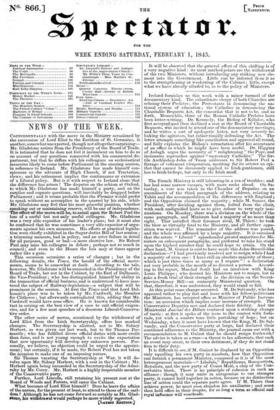th a t he could hope to attain. On the other hand,
M. Guizot is said to have made this John-Russell-like declaration—" I had previously resolved not to resign while I had a majority of even one : I have still an absolute majority of three; which is just three times as many as I require " : a declaration not very probable in the mouth of so discreet a person. Accord- ing to the report, Marshal Soult had an interview with King Louis Philippe ; who desired his Ministers not to resign' but to Sake a fresh trial of their strength in the division on the Secret- Service-Money Bill—an eminently Ministerial question, On that, therefore, it was understood, they would stand or fall. At this point some change occurred. M. Be Salvandy, who has appeared rather to play fast and loose with his fellow-politicians the Ministers, has accepted office as Minister of Public Instruc- tion: an accession which implies some increase of strength. The Conservative Deputies met and declared their fidelity. And the Ministerial Journal des Debate ventured upon a striking change of tactic : at first it spoke of the issue to the contest with forti- tude yet with a sombre tone little partaking of hope ; but on Wednesday, when it must have known that the Kincr, M. Be Sal- vandy, and the Conservative party at large, had declared their continued adherence to the Ministry, the journal came out with a recommendation to M. Guizot that he should resign forthwith ! The advice is taken as a ruse—a threat to lax adherents, that such an event may occur, to their own detriment, if they do not stand firm to their duty. It is difficult to see, if M. Guizot be displaced by an Opposition only equalling his own party in numbers, how that Opposition can furnish a permanent Ministry, composed as it is of the most heterogeneous materials—" Liberals," Republicans, Bonapartiste, Royalists, and the new party of Count Mole, a chip of the Con- servative block. There is no principle of cohesion in such an alliance : though it may unite in antagonisin to one stronger party, it cannot hold together in action, because on no distinctive line of action could the separate parts agree. If M. Thiers thus achieve power, he must soon abandon his auxiliaries; and must then hold office in their despite, for as long a term as official and. royal influence will vouchsafe.


























